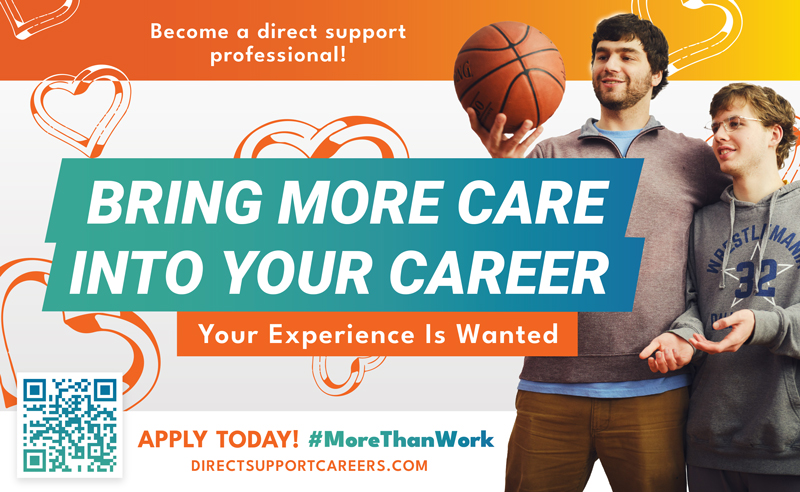People with autism have the potential for growth at every stage of life. When providing care for autistic adults, know that every moment and interaction can make a difference in their well-being and independence if you understand how they learn. Many of the people who receive support at The Summit Center are navigating significant challenges related to their autism. They may experience difficulty with communication, self-help skills, or sensory processing, and yet they push themselves to accomplish their goals and try new things. It brings me joy.

A smiling young man at The Summit Center’s Day Program
Photo Credit: The Summit Center
Working in a community-based day habilitation program, I interact with people not just as a professional but very much on a personal level as well. Providing tailored support and accommodations is critical to enjoying a full life.
There is a common belief that autistic people reach their potential upon graduating from high school. That is certainly not true. Like everyone, they continue to learn well into adulthood and oftentimes experience milestones and breakthroughs while adults. Recently, a gentleman learned sign language and became proficient enough to let his program supervisor know that he enjoys his favorite lunches!
We pride ourselves on our program S.T.E.P.S. (Success Through Engagement and Positive Supports). S.T.E.P.S. centers around activities that we organize based on people’s interests. This could include bowling, going to the zoo, gardening, or participating in volunteer services. Helping them feel comfortable among their peers and taking part in familiar activities is always paramount.
This holistic support and care for autistic adults can be provided in various ways while being personalized as much as possible. A few strategies that I have found particularly impactful are:
- Breaking down skills into very small steps
- Giving opportunities for practicing a task or skill in several settings and scenarios
- Understanding sensory needs (hypersensitivity vs. hyposensitivity) around lights, sounds and smells
Every day, I see firsthand how our passionate and dedicated staff helps empower autistic people. The recent launch of the #MoreThanWork Direct Support Professional (DSP) recruitment campaign exemplifies the importance and value of direct support as a career path, which is very encouraging. This comprehensive statewide campaign highlights the essential role DSPs play in the lives of people with developmental disabilities while promoting the tremendous value and meaningful impact a DSP career can provide. This campaign is a call to action that will directly help the people we support and further develop future leaders in our field.
The autistic spectrum is not linear. It has multiple facets that manifest in people in countless ways. There’s a reason for the saying, “If you’ve met one person with autism, you’ve met one person with autism.” Every individual is impacted by their own unique combination of language skills, social awareness, sensory processing, and thinking and repetitive behaviors.
Understanding one’s support needs, setting boundaries, and asking for help are critical skills that every person with autism should develop while learning how to advocate for themselves.
Today, I am as optimistic as I have ever been in my direct support career. Initiatives and investments like #MoreThanWork provide necessary growth and development across regional and statewide workforces, which ultimately and most importantly have a positive effect on New Yorkers with developmental disabilities. I applaud these efforts and encourage continued investment in this field. After all, everything we do is to make lives better. We cannot forget that.
Laurlen Coker is Coordinator of Adult Day Services at The Summit Center. The Summit Center is Western New York’s leading provider of evidence-based educational, behavioral health, adult, and community programs to more than 1,000 children and adults each year with developmental, social, and behavioral challenges. Learn more about the organization at www.thesummitcenter.org.







